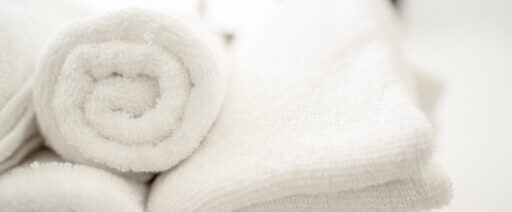How to Make Towels Soft Again

After frequent use and regular washing, towels can become rough and scratchy, and lose the softness that makes them so comfortable following a steamy bath or shower. Beyond causing discomfort, abrasive towels can irritate and damage soft skin, and you should not use towels that are too rough for this reason. However, instead of throwing them out, read our guide and consider the following methods for making your towels soft again.
Should I use fabric softener?
While fabric softeners are great for softening clothes, their effects on towels are the opposite. Fabric softeners leave a residue that gets caught in the towels’ fibres, causing them to harden. To avoid this, wash towels separately from loads of laundry in which you are using fabric softener. This alone may not be enough to make them soft again once your towels have hardened, but it is vital to know if you want to prevent this from happening in the future.
Softening towels with white vinegar
White vinegar has a lot of utility around the house, from removing stains to disinfecting surfaces. Softening fabrics is just one more use for this versatile spirit. Adding a cup of vinegar to a wash with your rough towels can remove the residue left by fabric softener and return the towels’ fibres to a softer state.
This method may not work completely on the first wash and you may have to put your towels through a number of cycles before you can enjoy the results. The amount of cycles required will depend on how much residue is on the towels – if they have been rough for a while, it may take longer.
You may be concerned about putting vinegar in your washing machine, but the intensity of the cycle (and subsequent cycles with detergent) will ensure that there are no traces of the vinegar left to get on your clothes.
Softening towels with baking soda
Similar to vinegar, baking soda is used in a number of alternative cleaning methods. Add half a cup of baking soda to your wash and it will react with any softener residue and dissolve it. In addition, it may eliminate certain odours accrued from dampness.
Using baking soda may be a better option than vinegar for those worried about odours and contamination, as it is a more neutral substance that will not linger in any noticeable way.
Brush your towels
You can remove some of the softener residues and separate the threads by running a hairbrush over your towel. It is best to do this following a clean wash and after the towel has dried. This method may take more time than the previous methods but can work well if you use the right brush.
Do not use too much detergent
Washing fluffy towels in warm water with just the right amount of laundry detergent will reduce the chances of them becoming rough and scratchy, and they will last longer. This may make your towels softer, but for the best results, combine this method with one of the above if your towels are already abrasive to the touch.
Find the best washing method
Every fabric product should have a label detailing the washing requirements. Check this to find out at what temperature you should wash your towels and for how long. If your towel does not have a label on it (or it is no longer legible) you may be able to find a similar product made from the same material online and follow the appropriate care instructions.
Visit Linens Limited for high-quality towels and fabrics
At Linens Limited, we sell a number of towel and bathroom products made from different materials to provide exactly the level of comfort and style you need. For example, our Egyptian cotton towels are fluffy and soft, and with the advice in this guide you will know how to take proper care of them and keep them that way.
Visit our Bath Linens section for more information and products that may be able to replace your stiff towels. Speak to us on 0800 389 0059 or 0161 627 1755, or fill out an online contact form and we will return your call at a time convenient for you.
Add a comment

